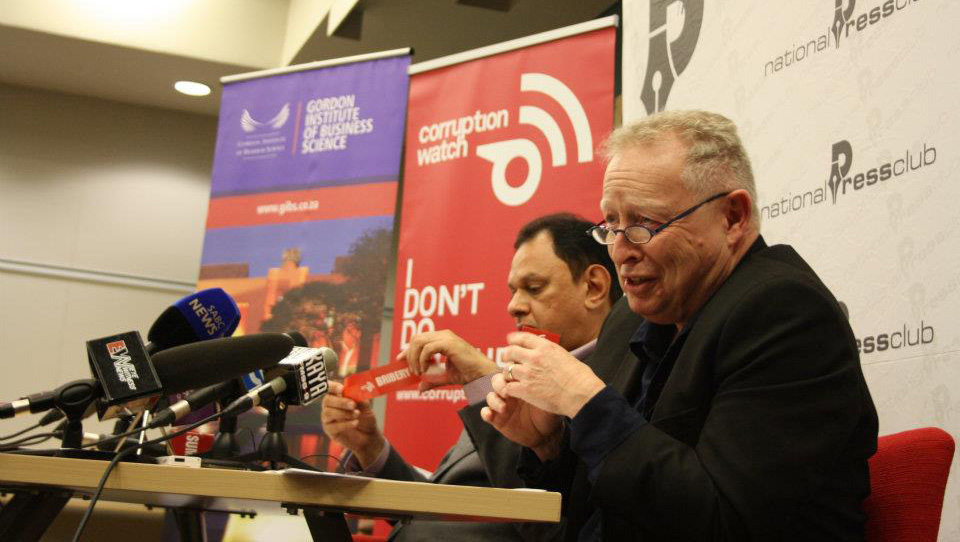Corruption Watch attacks South African graft


Drive down any main street in Johannesburg and there will be one constant -- newspaper placards breathlessly detailing a corrupt official exposed, a shady government deal laid bare. South Africans have fought corruption for generations, and a new cohort of anti-corruption activists are taking to the web to try to clean up dishonest practices in local business and government.
For the past year a non-profit organization has worked to fight corruption across South Africa. Corruption Watch is a non-profit organization that looks into public complaints of corruption gathered through their website, Facebook page, text messages, email and even through the post. Its principal weapons are reports that it investigates then publishes on its site and in a number of the country's largest media outlets.
Combatting South African corruption is an immense task. A recent audit by international accountancy firm BDO found that South Africa has the second highest incidence of corporate corruption and fraud in the world. Washington-based Global Financial Integrity estimates that $20 billion has illegally left South Africa since 1994.
"Given the fact that corruption is a conspiracy against the public, the public must participate in rejecting it," David Lewis, Corruption Watch's executive director, told the local news site the Daily Maverick on Corruption Watch's first anniversary in January. "As important as law enforcement is, and I don't underestimate law enforcement's role in fighting corruption, wide-scale graft must be resolved by serial acts of prosecution,"he said.
Lewis has a long history within the South African government and organized labor. "As both a trade unionist and public servant at the competition authority, I've seen how public money and resources are squandered by both the public and private sectors," he says on Corruption Watch's website. He hopes that the organization can help "protect these resources so they are directed to the very people they are meant to support.""
"Corruption and fraud costs South Africans in excess of R100-billion [$10.7 billion] each year. It is eating at the very fabric of our society," Alison Tilley, Executive Director of the Open Democracy Advice Centre, said at a conference in 2011. Tilley was announcing the launch of National Whistle Blowers Week, an early attempt at creating a space for South Africans to report corruption without facing backlash from entrenched power. "Fighting corruption starts with individuals," she continued. "Small acts of courage can have a massive impact."
Whistle Blowers week helped start a movement to get ordinary citizens to combat corruption. Lewis hopes that Corruption Watch is continuing the effort by empowering local South Africans to report large and small incidents of corruption.
South Africa's relationship with corruption is complicated and official statistics regarding the size of the problem are hard to pin down. Much of the local press's energy is directed toward unmasking official corruption -- publicizing questionable government tenders and public officials' extravagant lifestyles. Relatively little effort is spent trying to expose private sector corruption.A 2006 survey of local businesses commissioned by Business Against Crime South Africafound that three-quarters of businesses canvassed think that there is "a poor ethical culture" in the South African business community and that this environment is "harmful to further investment in South Africa."
Yet a competitiveness report published this year by the Global World Economic Forum isn't as pessimistic about business prospects in the country. Companies ranked corruption as only the fifth most challenging aspect of doing business in South Africa. Their largest complaint was that the local workforce is undereducated.
Still government and private corruption can overlap, and an unskilled workforce is a failure of the education system that was meant to prepare it. Almost a fifth of South Africa's budget is funneled into education, but in many cases poor South Africans leaving high school are less employable than they had been under Apartheid.
Corruption Watch's latest campaign is an extensive look at corruption in schools. On the heels of a scandal last year that left thousands of textbooks destroyed rather than delivered and scores of schools without learning materials for months, many South Africans who remained ambivalent towards corruption were angered by the images coming out of rural schools. Corruption Watch is hoping to capitalize on this by attacking graft in schools throughout the country. Education is the one area that could possibly have the largest economic return if the problem of corruption there could be solved.
Part of its latest campaign is a series of animated shorts aimed at younger South Africans. The pieces, funny yet educational, follow "Bra Tjotjo" (meaning bribe in local vernacular) as he schemes his away around the country. Most of the shorts end with someone reporting the fraud through a text message to Corruption Watch.
"There are a lot more people who are talking about corruption, and there are a lot more people who are outraged about corruption," Lewis continued in the Maverick interview, talking about South Africa's old attitudes toward graft. "Two or three years ago sometimes even quite intelligent people, but who were admittedly quite self-interested, were anxious to present corruption as some kind of suburban preoccupation. I think that the last couple of years have shown that this has changed."
Photos and Video: Corruption Watch
This post was originally published on Smartplanet.com